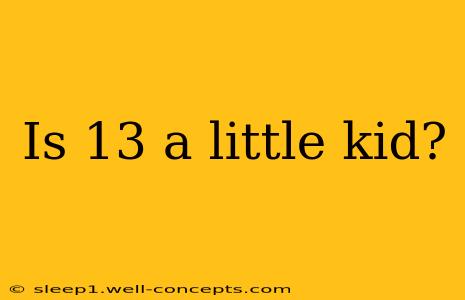Is 13 a Little Kid? Navigating the Tween Years
The question of whether a 13-year-old is a "little kid" is complex and doesn't have a simple yes or no answer. It depends heavily on individual development, societal context, and the specific situation. Let's explore the nuances of this age group.
Physical and Biological Development:
At 13, individuals are undergoing significant physical changes associated with puberty. This can manifest in different ways and at different paces, making generalizations difficult. While some 13-year-olds might appear physically mature, others may still retain a more childlike appearance. This biological variation is a crucial factor to consider when assessing their maturity level.
Cognitive and Emotional Development:
Cognitively, 13-year-olds are entering a stage of abstract thinking, although their emotional regulation might still be developing. This can lead to mood swings, impulsivity, and a desire for independence that often clashes with parental expectations. This developmental stage is characterized by a significant push for autonomy and self-discovery, often causing friction as they navigate their newfound independence.
Social and Cultural Context:
Societal norms and cultural expectations play a significant role in how we perceive 13-year-olds. In some cultures, 13 might be considered the start of adolescence, with increased responsibilities and expectations of independence. In other cultures, the transition to adulthood might occur later. This variation highlights the importance of considering cultural context when addressing this question. Furthermore, the specific social environment—school, family, peer groups—will also significantly shape experiences and perceptions of this age group.
The Shifting Definition of "Little Kid":
The term "little kid" itself is subjective. What constitutes a "little kid" varies widely depending on individual perspectives and experiences. For some, it might evoke images of toddlers or elementary school children. For others, it might encompass pre-teens. Therefore, applying this term to a 13-year-old requires careful consideration of these varying definitions and the context in which it’s used.
Conclusion: A Spectrum of Development
Rather than definitively labeling a 13-year-old as a "little kid," it's more accurate to acknowledge them as individuals navigating a complex stage of development. They are transitioning from childhood to adolescence, exhibiting a mix of childlike behaviors and emerging adult characteristics. Understanding this developmental spectrum is crucial for fostering supportive and age-appropriate interactions and expectations. Treating each 13-year-old as an individual, considering their unique developmental trajectory and circumstances, is vital for promoting healthy growth and well-being.

